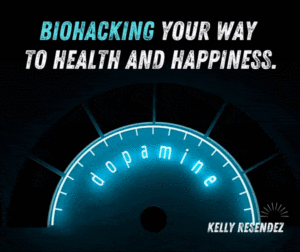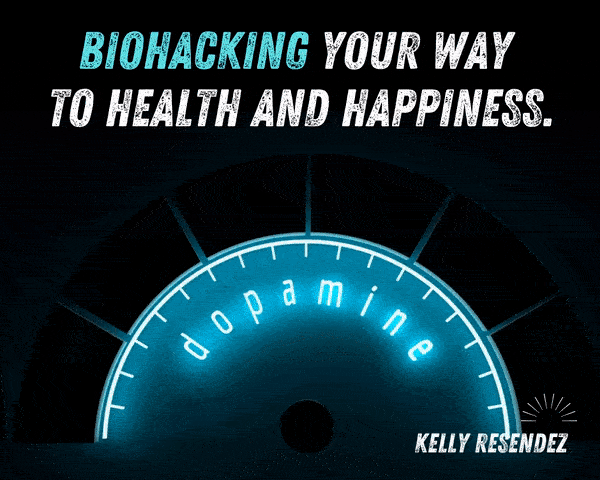15 MORE things you didn’t know about clean energy. 🌿
September 13, 2021
Conversations on Leadership w/ Kelly Resendez: #1 The truth, leadership development, and identifying potential
December 18, 2021
You may have heard of the term ‘biohacking,’ as people try to convince you that their diet, coffee, Ted talk, or system will vastly improve your health and happiness. And while some of those may be effective, each and every one of us can biohack our own lives and consciously improve those outcomes.
There are many definitions and meanings to biohacking, some of them slightly nefarious if not outright commercial. But the simple, layperson definition of biohacking is the manipulation of conditions to upgrade our brains and bodies. Basically, we all want to optimize our health and happiness, and what we do, eat, think, etc. holds great sway in that process.
As we undertake any conversation about biohacking, it’s important to understand the core biological and neurological processes that dictate your mood, happiness, and positive emotions.
Together referred to as the “happiness chemicals,” these include a host of hormones including the major four:
- Dopamine
- Endorphins
- Oxytocin
- Serotonin
While there are whole volumes of scientific journals documenting the intricacies of these four hormones, I will try to summarize here.
- Dopamine is best described as the “reward drug,” as it triggers feelings of pleasure or gratification and acts as a great motivator.
- Endorphins, short for “endogenous morphine,” are hormones that act as natural pain killers. They do so by interrupting and limiting the flow of pain signals throughout your body.
- Oxycotin is known as the “love drug,” instilling powerful feelings of warmth, tenderness, and physical or emotional closeness. Oxycotin plays an integral part both in romantic relationships and childbirth or paternal emotions.
- Serotonin is a different animal than the others, as it’s a neurotransmitter with far-reaching positive effects throughout our bodies and systems. Most prominently, it limits aggression and impulsiveness while bringing calm as relaxation. Therefore, serotonin is known as nature’s mood stabilizer.
Serotonin manifests itself in many positive ways for your health and happiness, including appetite regulation or suppression, sleep, memory, and learning ability.
Here are some simple and effective ways to biohack the release of these four feel-good hormones, and more:
- Sleep
Sleep is our greatest natural healer, resetting and recharging just about every process in the human body. Quality and abundant sleep has also been proven to boost the immune system, prevent disease, and prolong the years in our lives. While we do know that sleep basically purges metabolic toxins, getting a good night sleep is easier said than done these days. Avoid electronic screens before bed, leave the phone out of the bedroom, skip the evening alcohol or caffeine, and try to keep a regular sleep schedule.
2. The great outdoors
Time spent in nature is one of the fastest and most effective biohacks. It makes perfect sense that fresh air helps us feel better, and numerous studies back up the assertion that time spent outdoors (often combined with physical activity) has been proven to improve health.
3. Exercise and physical activity
One of the single best ways to nearly-instantly facilitate the release of “feel good chemicals” is to get up, get moving, and break a sweat. From just taking a walk or taking the stairs to hitting the gym and leaving soaked in sweat, any sort of physical activity or exercise floods our system with the endorphins and even dopamine.
4. Eating healthy food
Across the world, there are almost as many types of food and cooking as there are cultures, but one thing is consistent: eating healthy, nutrient-dense, natural foods greatly boosts health, discourages disease, and enriches mood and happiness (not to mention leaving the pounds off!).
5. Gratitude
There are many names to it: mindfulness, intentionality, or just gratitude, but it all comes down to the same thing: taking a moment (or more!) to catalog the good things in your life and feel thankful for them. Numerous studies show the incredibly quick and transformative power of simply making a Gratitude List or meditating in gratitude every morning. But no matter what time of day you choose to be thankful for the people, places, and things in your life, it will release plenty of feel-good hormones, including serotonin.
A simple moment for gratitude can almost-instantly change your chemistry, one of the best biohacks there is for health and happiness!
6. Meditation
Meditation is an essential biohack, with proven results for even 10 or 20 minutes of focused meditation every day. Deep meditation triggers the release of plenty of neurotransmitters and feel-good hormones, including serotonin, dopamine, endoprhins, and many more. You don’t need any equipment, a dedicated space, or even an hour free to effectively meditate – it can be done virtually anywhere and with mounting benefits the more you stick with it, making it a vital biohack.
7. Purpose in your life
I wanted to include the next two items on our list because they aren’t as commonly covered as the other items, but pivotal for a long life of health and happiness. One of these is having a purpose to your life.
Having something to believe in, be a part of, and contribute to – greater than your basic needs or just money – is proven to emit strong dopamine release and other neurotransmitters. Whether it’s a passion, a hobby or interest, or just contributing to a group in a utilitarian fashion, purpose leads to positive health outcomes.
8. Community and connection
Similar to the purpose-drive biohack listed above, being part of a community and having abundant human connections opens the floodgates for happiness chemicals. Deep relationships with other humans – or even our pets – biohack our chemistry in powerful ways. Basically, no woman or man is an island, and social isolation or lack of human connection is linked to numerous health risks and conditions.
We see evidence of this human-community-biohack relationship in Blue Zones, which are those geographic pockets around the world where people commonly live past 100 years old. Aside from diet, exercise, and other factors, one of the key indicators of living a long, healthy and happy life is the presence of strong human connections. Of course, that could mean your spouse, children, or family, but it also could include friends, neighbors, people at your church or house of worship, or civic group.
But just being connected to others and part of a community goes hand-in-hand with purpose in your life.
By no means is this list exhaustive, and there are plenty of other ways to biohack the release of happiness chemicals and hormones.
Other quick and easy biohacks:
- Stand up desk at work
- Eating dark chocolate
- Laughing and joking with friends
- Exposure to sunshine
- Music
- Finishing small tasks
- Self-care
- Celebrating even small victories
- Playing with animals
- Complimenting someone
- Giving (and getting!) a hug
Can you implement some of these biohacks into your life to improve your health and happiness? I’d love to hear about it, so thanks for sharing your journey!
References:
https://www.theatlantic.com/health/archive/2019/03/top-biohacks/584584/
https://www.goodnet.org/articles/happiness-biohacks-to-feel-your-best
https://en.wikipedia.org/wiki/Endorphins
https://en.wikipedia.org/wiki/Serotonin
https://en.wikipedia.org/wiki/Dopamine
https://en.wikipedia.org/wiki/Oxytocin
https://commons.clarku.edu/cgi/viewcontent.cgi?article=1017&context=surj



